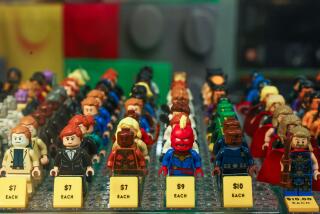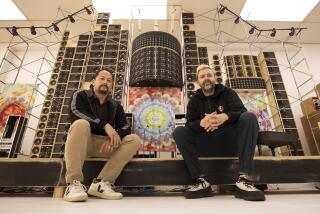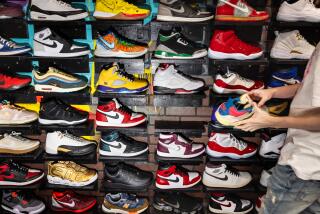Getting a Head in Business : Brea’s Skullduggery Inc. Specializes in Museum-Quality Craniums
TUSTIN — People spend billions of dollars every year buying all sorts of odd things from mail-order catalogues. But one of the oddest may be the museum-quality replicas of dinosaur and prehistoric human skulls sold by Skullduggery Inc.
For about $100, you can buy a replica of a human skull made of gypsum cement that looks just like bone; or a Tyrannosaurus rex skull, the big predator’s long, jagged teeth clamped together in a nasty grin.
Each looks authentic: Skullduggery borrows the original fossils from museums, makes a cast and then pays the museum a fee for every replica it sells.
Small museums that couldn’t afford real fossils used to be the biggest customers. In fact, the company says, it still competes with several small firms in that market.
In recent years, Skullduggery has unearthed a new market: upwardly mobile types who just have to have a saber-toothed tiger skull to grace their office desk. The company says it now sells as many as 7,000 skulls a year.
Ever wonder who runs those outfits that sell rare records, redwood jungle-gym sets, aged Iowa steaks and all that other stuff in the back of the New Yorker, Rolling Stone and Smithsonian magazines?
Well, Skullduggery is one of those firms.
A warm Santa Ana wind is blowing around outside Skullduggery’s small Tustin digs on a recent sunny morning. But inside it’s a quiet day. Like most retailers, Skullduggery has its busiest three months at the end of the year, the Christmas season.
In the front office the mail carrier stops by to drop off a stack of mail, but the phones are mostly quiet. Out in the back, in the shop, four workers turn out a couple of dozen skulls a day. The skulls sit in rows on shelves and tables, sightless eye holes staring off into space.
Skullduggery is a family affair. In this case, it’s the Koehl family, which bought half the company in 1987 from a guy named Steve Gagnon, who started the business in 1978 on his family ranch in Fullerton. Most of the company’s initial sales were to museums.
Peter Koehl, a consultant, was introduced to Gagnon, who was looking for a partner to help run the small company. Koehl decided the business had potential and bought in. Gagnon has since moved to Oregon and, the Koehls say, doesn’t want to talk about the company.
The Koehls moved the business from the Fullerton ranch to a small factory building in Tustin. On the cheap, they expanded not only the company’s market but its product line. Skullduggery’s slick, four-color, $2 catalogue is published from the Koehls’ desktop computer. The company saves money by featuring members of the family modeling fossil T-shirts, which it also sells.
Skullduggery has lots of other products besides skulls: silver saber-tooth tiger jewelry; knives and letter openers made from real dinosaur bone that was “unsuitable for scientific study”; an “adventure hat” suitable for African explorer-types; dinosaur paper sculptures; books on fossils and anthropology; children’s brightly painted wooden dinosaur rockers; better-looking-than-you-might-expect dinosaur ties; dinosaur board games and dinosaur posters.
Although the company won’t disclose its sales, it does say that about a fifth of its total sales come from items other than skulls. The other products are more affordable than the skulls, which can run as much as $269 for a three-horned Triceratops skull.
Dinosaurs, clearly, are big these days: Interest in them seems to run in cycles, and they made a comeback in the 1980s; museum shows on the prehistoric creatures have been attracting big crowds for years. Harder to explain is the fascination with the replicas of skulls of prehistoric humans, modern apes and a modern man and a woman that Skullduggery sells.
“Great artists,” says the company’s advertisements, “since the days of da Vinci and Michelangelo have studied the human skull.
“Now, from Skullduggery, extraordinary replicas for your studio; modern male and female skulls so beautifully detailed and patinaed that they have been acquired by museums throughout the country.”
Skullduggery and other specialty retailers have proven that you can sell almost anything by mail. But mail order is still a tough business, and never more so than in a recession.
The Tustin firm’s sales actually went up last year, despite the weak economy, says Peter Koehl IV, Koehl’s son and the company’s general manager. (His sister, Cornelia, makes the molds, and their mother, Emmy, is vice president of marketing.)
The company’s mail-order sales, though, slumped last year. Skullduggery was able to salvage a decent year, however, by boosting sales to retailers.
That’s the direction Skullduggery seems to be going. Sales to retailers such as Sharper Image and Natural Wonders accounted for nearly a third of revenues last year compared to a tiny fraction when the company was starting out.
Profit margins are high enough that Skullduggery can sell to stores wholesale at half the skulls’ retail price and still make a tidy profit, says Peter Koehl IV.
By selling to retailers, the company doesn’t have to depend as much on picking just the right magazine to reach its broadest market. That can be a hit-or-miss proposition for a company this small, Skullduggery says. And yet it’s crucial to success in the mail-order business.
The company’s research has shown that its market, not so surprisingly, is moderately well-educated, moderately affluent and mostly male.
“This stuff is not expensive, but it’s not cheap,” says Koehl, 27. “It’s not stuff you really need, either.”
The company has had the most success advertising in the Smithsonian, the magazine of the Smithsonian Institution in Washington. A two-inch ad in that magazine costs more than $2,000 a month but can generate thousands of calls, company officials say.
Other magazines have proven not so hot: The New Yorker, for instance, has the right upscale demographics but doesn’t sell many skulls, probably because its readership isn’t particularly interested in anthropology and paleontology. Ads in Sunset magazine didn’t do much better. Still, making fossil replicas sounds a lot more fun than, say, making printed circuit boards. Amusing enough, in fact, that Peter Koehl IV has stayed with the company since getting out of UC Santa Barbara in 1986 with a degree in psychology. (The elder Koehl, who is president, tends to keep a low profile and still works as a consultant.)
At one time the son was going to enroll in a Ph.D program. Now he says he’s in no hurry.
“I never thought I’d wind up in business,” he says. “But then I never thought business could be so much fun.”
More to Read
Inside the business of entertainment
The Wide Shot brings you news, analysis and insights on everything from streaming wars to production — and what it all means for the future.
You may occasionally receive promotional content from the Los Angeles Times.










